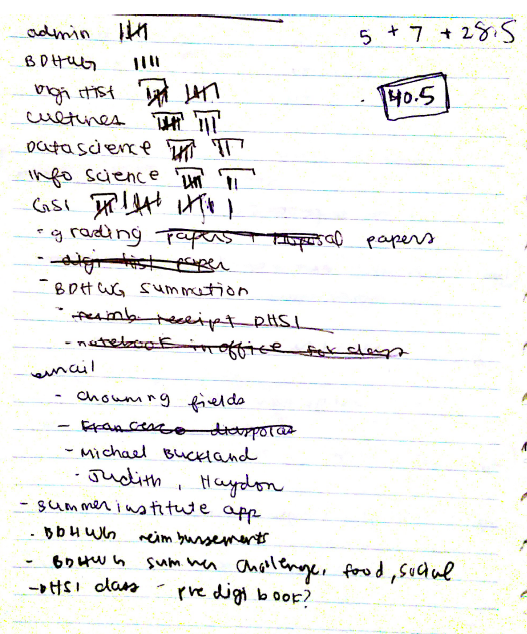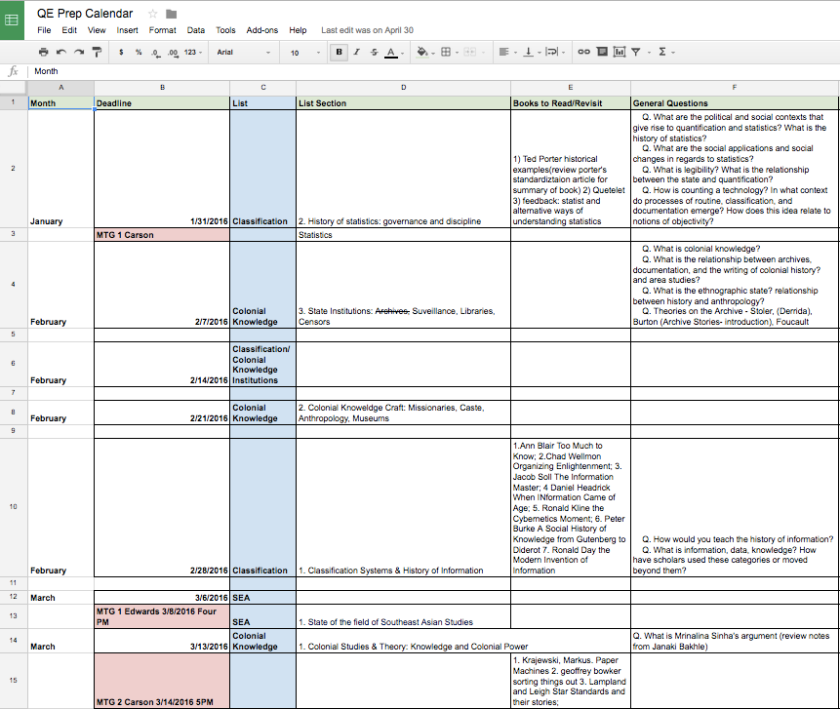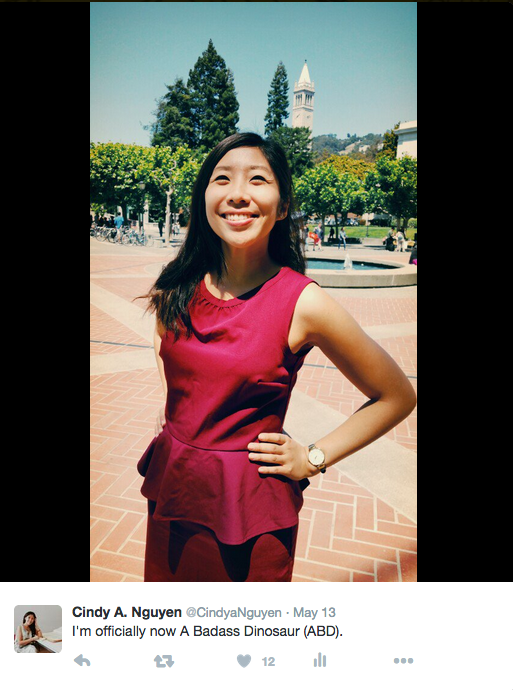
Quantifying Labor: an Introduction
Graduate school perpetuates a nebulous concept of ‘work.’ In the academy we are always working—from research to teaching, grant writing to meetings, emails to professional networking. But for me, this concept of always working weighs me down. It is easy for me to forget why I’m doing this whole academy thing, and what it is I’m actually doing at the moment.
Thus, for the past two years of graduate school, I have quantified my labor. It started as a personal challenge if I could maintain a ’40-hour work week’ and have some resemblance to work-life balance. But over the years, I found that quantifying my labor was both personally revelatory and an affirmation of my work. Much like the ‘quantified-self movement,’ I wanted to know what I do with my time, so that I could more efficiently use my time. But most importantly, quantifying my labor reminded me why I was pursuing a Ph.D. in Vietnamese history.
For example during the years I took coursework I would record how long I spent on the following:
- Reading and preparing for my graduate seminars each week
- Administrative work (e-mails, meetings)
- My time I spent on digital humanities (during this time, I was a co-convener of the Berkeley Digital Humanities Working Group)
I am and avid user of the ‘Pomodoro’ method, a time tracker where I work in 25 minute bursts with 5 minute breaks. This helped me to focus and to remember to take breaks. I use the app Pomodoro One for my MacBook and Simple Pomodoro on my Android phone. I also use a notebook to tally up ‘pomodoros’ (30 minutes of work) according to each category of work as well as to-do reminders.

This collection of data was incredibly informative for me because it allowed me to visualize my labor. I was working, making small progress based on the little ticks I made on a sheet of paper. But as my time became more and more limited I also learned that it was not just about making progress, but about placing a cap on how much time I could dedicate to each task. I loved my work with digital humanities, but planning for events, hosting meetings, and my own dh learning could be endless. Thus, I only allowed myself a set number of ~10 hours/each week.
Similarly, I learned that in my graduate seminars I could read every word in each of my 1000 pages of assigned weekly reading. But reading that closely (and slowly) was not the best way for me to understand a book, the main concepts, and its historiographical intervention. Thus, I learned to read efficiently and effectively by placing a limit on how much time I was allowed to read for each class.
In quantifying my labor I worked more efficiently. I dedicated my hardest work to mornings (such as writing), and my time intensive work to afternoons (such as reading, research, and e-mails). I noticed that my hyper focused work meant that I was usually done and my energy was depleted by the afternoons. This meant that I could keep to my strict rule of not working after dinner.
The idealistic goal of finishing all work within 40 hours was not always met. But at least I could look visibly look at my work and remind myself, “Yeah, I’ve worked hard. I deserve a break.”
Quantifying Labor & Gamifying Leisure for my Qualifying Exam Preparation
I continued this practice of quantifying labor during my year of qualifying exam prep at Berkeley from Fall 2015 to Spring 2016. In the field of history, the qualifying exam is an intense (to say the least) oral examination, where a committee of five professors ask me questions about hundreds of books I have been assigned to read. Each of the professors and their book list represents a collaborative defined ‘research field.’ Mine comprised of the following research fields:
- “Vietnam”
- “Southeast Asia- Print, Culture, Colonial History, and Memory”
- “Systems of Knowledge – Agents and Institutions of Colonial Knowledge”
- “Systems of Knowledge – History of Information and Classification”
- “Digital Humanities & Data Science”
An Aside: My Exam Committee and Performing Knowledge
Throughout the Fall 2015 I met with professors and discussed my qualifying exams, expectations, and reading lists. These series of meetings set the tone for my actual exam day and gave me insight into the types of questions and books I should focus on as I prepared. The biggest takeaway from these meetings and the composition of my final exam committee was this: intellectual and personal compatibility. How compatible were these professors with my research? Did these professors actually care about my work and listen? Did they make time to meet with me? Did they ultimately want me to succeed?
I was privileged to have a supportive, honest, and encouraging committee who was real about the exam. Through open communication with my committee, I knew that the exam was an exercise in intellectual self-discipline as well as the ultimate performance of knowledge. My committee discussed what the exam meant for my career as a future academic such as cultivation of skills like public speaking, commanding an audience, and self-confident declarative statements. The exam was not about knowing the answer to a question, but the level of poise and confidence I could communicate an answer—any answer that gestured toward the question.
By Spring 2016 I could no longer talk abstractly about the impending qualifying exams scheduled for Friday the 13th of May. I could no longer dwell in angst and anxiety on the length of my 300-400 book reading list, the impossibility of reading and remembering everything, and the hierarchical performance of knowledge and power of the exam itself.
I’m a concept, structure, and direction-based person (I’m an INTJ for your Meyers-Briggs lovers out there). I needed to know I was making some progress, and I needed to be reminded what I was doing and why. Thus, the idea of 6 months of ‘reading’ needed to be parsed out and made meaningful.
Breaking Down 6 Months of Reading
I used Google Sheets/Excel to break down the 6 months into weeks. I made my own deadlines of which lists, list sections, and meetings with my committee members I should finish, and I noted key questions and books that came up during those meetings. I wrote summaries after each meeting, notecards with answers to key questions, and most importantly asked fellow graduate students and other professors for advice on how to prepare and organize my time.

Breaking Down my Days with ‘Habitica’
For me, thinking in bursts of months was not useful. Rather I thought about the “small wins” each day to keep me motivated.
I learned that a sense of progress each day was incredibly important, and used the open-source productivity app ‘Habitica‘ to keep me on task and track my progress. Habitica is an incredible app that allows you to join other people who want to develop good ‘habits’ through a gamified interface of leveling up your character.

‘Habits’
In Habitica, ‘habits’ could effect your character health points and experience points in positive or negative effects ways depending on what you decide. You could do multiple habits in each day. Below are some of my habits:
Work & Exam Preparation
+ finish reading 1 book
+ write-up of 1 book
+ Updating this website with a book write-up
+ Saying “no” to an “opportunity” that is not worth my time
+ 30 minutes of academic writing
+ Meeting with committee
Lifestyle
+ 10 minutes of yoga or meditation
+ Do something I have put off for a long time (administrative tasks or personal projects)
– Buying something unnecessary
– Eating bad foods (sugar, carbs, alcohol) that inadvertently affected my mood and ability to work
‘Dailies’
In comparison, ‘Dailies’ were tasks that I had to accomplish each day. I assigned different XP weights to my dailies:
Work & Exam Preparation
- Finish 6 pomodoros
- Finish two books or articles on reading list
- Write something
Lifestyle
- Work on a creative project
- 10 minutes yoga/meditation
- No caffeine after 2PM
- Power down screens by 7PM
Habitica was a useful platform for me to record my tasks abut also remind myself the personal benefits of leisure, self-care, exercise, and rest. Thus many of my habitica habits and dailies incorporated a professional things like ‘Saying no’ to “opportunities” that took away from my limited bandwidth to prepare for exams and maintain a healthy life routine. Some of these “opportunities” included presenting at an unrelated conference, chairing a student organization, and the unending events that appeared to be “important” networking events for my career.
The past academic year was a long, drawn out test of endurance, self-discipline, and self-care. I found quantifying my labor and incentivizing leisure to be even more important for me because of the sheer emotional weight and ambiguity surrounding the qualifying exam.
Concluding Thoughts
Every Ph.D. student’s qualifying exams are different in tone, content, and purpose. But almost all grad students would agree that the exam symbolizes something—an intellectual rite of passage into the academic community, a test of self-discipline for independent study, or a clarification of academic fields.
For me, the exam meant all of this. But most importantly the process of preparing for exams pushed me out and beyond the throes of imposter syndrome. I put in a tremendous amount of labor, time, and energy to prepare for exams. I visibly saw the labor I contributed through quantifying my progress in pomodoros, tick marks, and Habitica. I knew, that I knew my shit. The actual exam day and the title of ‘A.B.D.’ (All But Dissertation) just happened to be the public affirmation that I belonged in the academy.


One thought on “How I Gamed the Academy: Quantifying my Academic Labor”